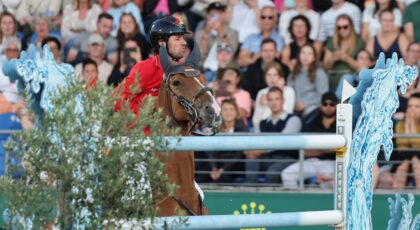In a lengthy prepared statement, Justify trainer Bob Baffert denied that he or his stable staff intentionally administered the then-banned drug scopolamine to subsequent Triple Crown winner Justify that resulted in the horse’s failed drug test following his Apr. 7 Santa Anita Derby win.
“I unequivocally reject any implication that Scopolamine was ever intentionally administered to Justify, or any of my horses,” Baffert said.
“Test results indicating trace amounts of the drug were undoubtedly the result of environmental contamination caused by the presence of jimsonweed in feed, a naturally growing substance in areas where hay and straw are produced in California. In addition, I had no input into, or influence on, the decisions made by the California Horse Racing Board.
“Following the Santa Anita Derby, Justify raced in three different jurisdictions during his Triple Crown run—Kentucky, Maryland and New York. He passed all drug tests in those jurisdictions. I call on the relevant testing agencies in those jurisdictions to immediately release information related to Justify’s test results.
“Justify is the one of the finest horses I’ve had the privilege of training and by any standard is one of the greatest of all time. I am proud to stand by his record, and my own.”

The New York Times and its racing writer, Joe Drape, reported yesterday that 2018 Triple Crown Champion Justify failed a drug test in California weeks before his victory in the Kentucky Derby, a race from which he would have been barred under Kentucky Derby rules had the failure become known to Derby officials. The story cites public documents, sources from the California Horse Racing Board (CHRB), that State’s oversight authority and independent experts by name, notably Dr. Rick Sams, who directed the drug laboratory for the Kentucky Horse Racing Commission from 2011 to 2018.
Justify’s positive drug test confirmed the presence of 300 nanograms per milliliter of scopolamine. While the substance can be naturally occurring in plants such as jimsonweed, sometimes accidentally introduced into a horse’s feed and hay, Sams is quoted in the Times article as saying: “I think (that amount) has to come from intentional intervention.”
Notice of the failed test was made Apr. 18 by the testing lab at the University of California, Davis following Justify’s Apr. 7 victory in the 2018 Santa Anita Derby and cited the presence of the banned drug scopolamine, considered by many equine veterinarians to be a performance-enhancing substance. Blood and urine samples from all 34 horses performing in Apr. 7 races at Santa Anita were delivered to the lab Apr. 10.
The positive test would have disqualified Justify’s victory in the Santa Anita Derby and denied him a gate in the May 5 Kentucky Derby under drug testing rules then in force and the points system currently used by the Derby.

Scopolamine is used in humans to relieve vomiting and some digestive disorders. As with many drugs initially created for humans, the drug is also used in animals. Dr. Sams says the drug can be used in horses as a bronchodilator, clearing a horse’s airway and optimizing heart rate, thereby making the horse run with greater efficiency.
Notice of the positive test results were sent to Justify’s trainer Bob Baffert Apr. 26, four days before Justify was scheduled to ship to Louisville for the May 5 Kentucky Derby. Baffert requested retesting of the samples by an independent lab, as was his right under CHRB rules. The samples were sent to the independent lab May 1. The second lab confirmed the positive result May 8, three days after Justify had won the Derby.
The test results could have negated his Derby win as well. Until this year, when Maximum Security was disqualified by Churchill Down’s stewards from his Derby win for interference, the only other Derby disqualification of a winning horse in the race’s 145-year history was in 1968 when Dancer’s Image was disqualified three days after winning the race when traces of the then-banned drug phenylbytazone, a non-steroid anti-inflammatory drug (NSAID) used to relieve joint pain, was detected in his post-race blood and urine samples. That drug is now legal, though its use is controversial. That year, Forward Pass was declared the Derby winner.
A disqualification from his Santa Anita Derby win would have denied Justify the points needed to earn a Derby gate under the current point system and possibly resulted in a racing suspension.

The problem of natural occurrence was known to the CHRB as long ago as Nov. 2016 when Medical Director Dr. Rick Arthur issued a warning to horsemen that the potential for a positive scopolamine result was “totally avoidable.”
After learning of the positive result Apr. 18, Dr. Arthur notified CHRB Executive Director Rick Baedeker, the CHRB legal staff and its chief investigator on Apr. 20 of the result by email and wrote this case would be “handled differently than usual.” Baedeker interpreted this as meaning the investigation had to be thorough.
Baedeker received notice of the confirming lab result May 8 and notified CHRB members that day of the positive drug test result.
The Times story reports it obtained a memorandum in which Baedeker writes, “The CHRB investigations unit will issue a complaint and a hearing will be scheduled.” That complaint was never filed and that hearing never took place.
On Aug. 23, 2018, the CHRB disposed of the inquiry in executive session, a tool used by regulatory agencies to keep their discussions and reasoning decisions exempt from public inquiry. This was the first time Baedeker used this tactic in his more than five years on the Board. The CHRB voted unanimously during that meeting to dismiss the case against Baffert.
The CHRB did report the positive test could have resulted from Justify eating contaminated food, which could be cited as a reason for the decision. In Oct. 2018, the CHRB voted unanimously to change the penalty for a positive scopolamine drug test from disqualification and forfeiture of winnings to a fine and possible suspension.
Present concern focuses on the timing of the case since Justify’s 2018 Triple Crown win was seen by many as a boost for a troubled sport and industry. But Baedeker defends that timing in the Times story.
“There was no way that we could have come up with an investigative report prior to the Kentucky Derby. That’s impossible. Well, that’s not impossible, that would have been careless and reckless for us to tell an investigator what usually takes you two months, you have to get done in five days, eight days. We weren’t going to do that.”
Concern also focuses on Baffert, himself not without controversy despite being the reigning most successful of Thoroughbred trainers with five Kentucky Derby winners and two Triple Crown winners in the past four years. American Pharoah also won the Triple Crown and later the Breeder’s Cup Classic under Baffert’s tutelage in 2015.
In 2013, seven horses trained by Baffert in California died over a 16-month period. A CHRB investigation revealed they had been given a legal thyroid hormone but had not determined if they had thyroid problems requiring the medication. The hormone is sometimes used to promote weight loss. Baffert told investigators at the time his goal had been to “build up” the horses.
He guided Bayern to a 2014 Breeders’ Cup Classic win at Santa Anita Park, his training base, after surviving a steward’s inquiry into whether his horse had interfered with three other horses—favored Shared Belief, local hero California Chrome and UAE Derby winner Toast of New York—at the very start of the race.

Justify had also endured skepticism during his Triple Crown run. He overcame the so-called Curse of Apollo, becoming the first horse since Apollo in 1882 to win the Kentucky Derby after not racing as a two-year-old. But he won on a muddy track at Churchill Downs, won the Preakness on muddier and fog-shrouded Pimlico and won a Belmont in which many observers suggested he was “escorted” by stablemate Restoring Hope.
Controversy, too, continues to revolve around Santa Anita Park, the site of 30 horse deaths during its winter season that began Dec. 26 and ended Jun. 23. Under pressure from State legislators and Governor Gavin Newsom, the CHRB was given expanded power to unilaterally terminate racing at California racetracks. Other safety measures have since been adopted and the suspect drainage system at Santa Anita improved in advance of the Nov. 1–2 Breeders’ Cup, the sport’s year-end championships.
The controversies did not prevent Ireland-based Coolmore from purchasing breeding rights to the 13th Triple Crown winner for $60 million from then-owners China Horse Club, Head of Plains Partners LLC, Starlight Racing and WinStar Farm. Though undefeated, the horse raced only six times.
Justify entered stud at Ashford Stud, KY in 2019 and shuttles between the Northern and Southern Hemispheres as a stallion in the respective breeding seasons. He presently is in Australia for the Southern season. His breeding price is negotiated up to $150k for a live foal, mating as often as three times daily. Earning up to $450k daily means Coolmore has already recovered its investment.

 September 12, 2019
September 12, 2019 

























